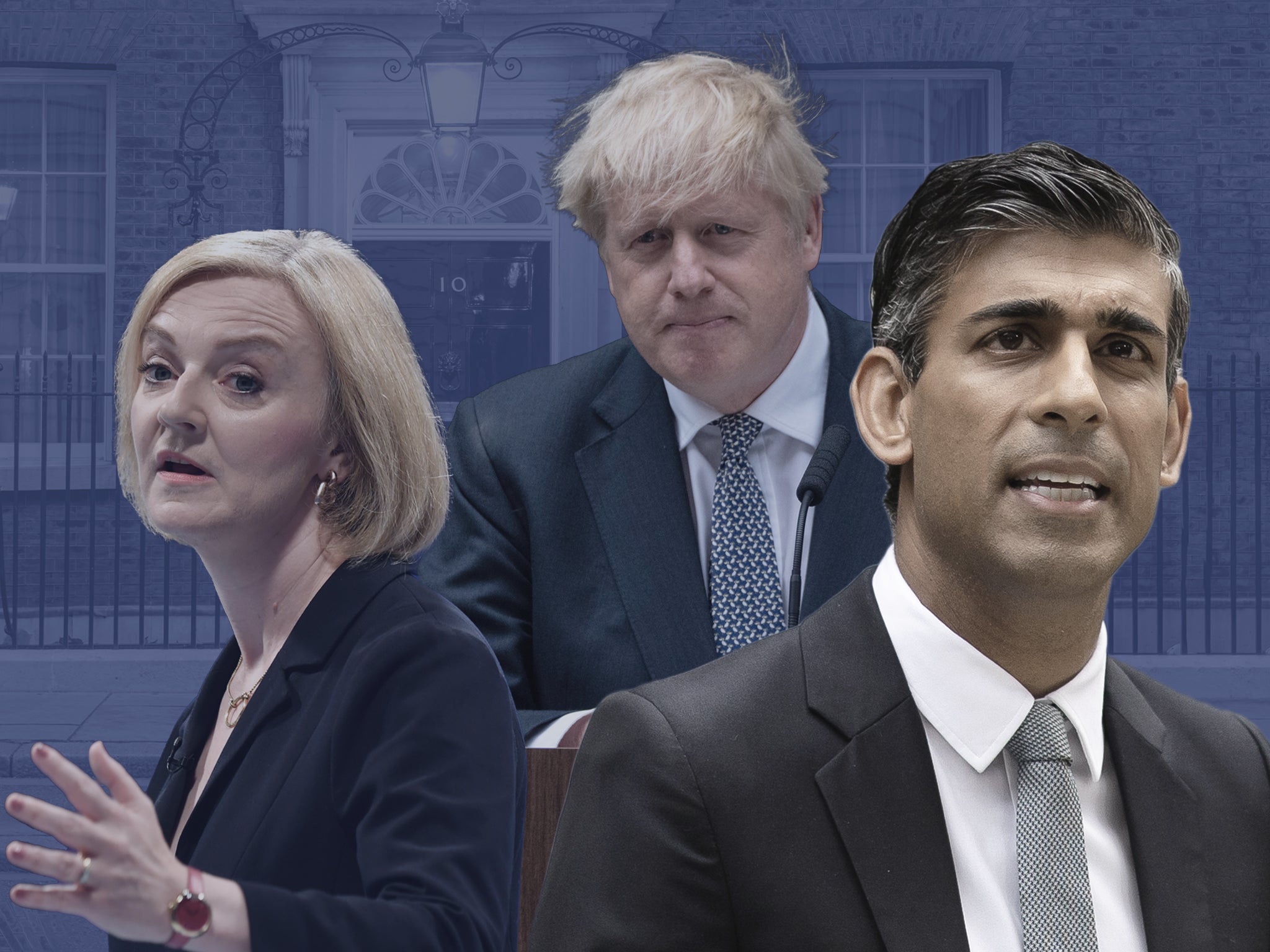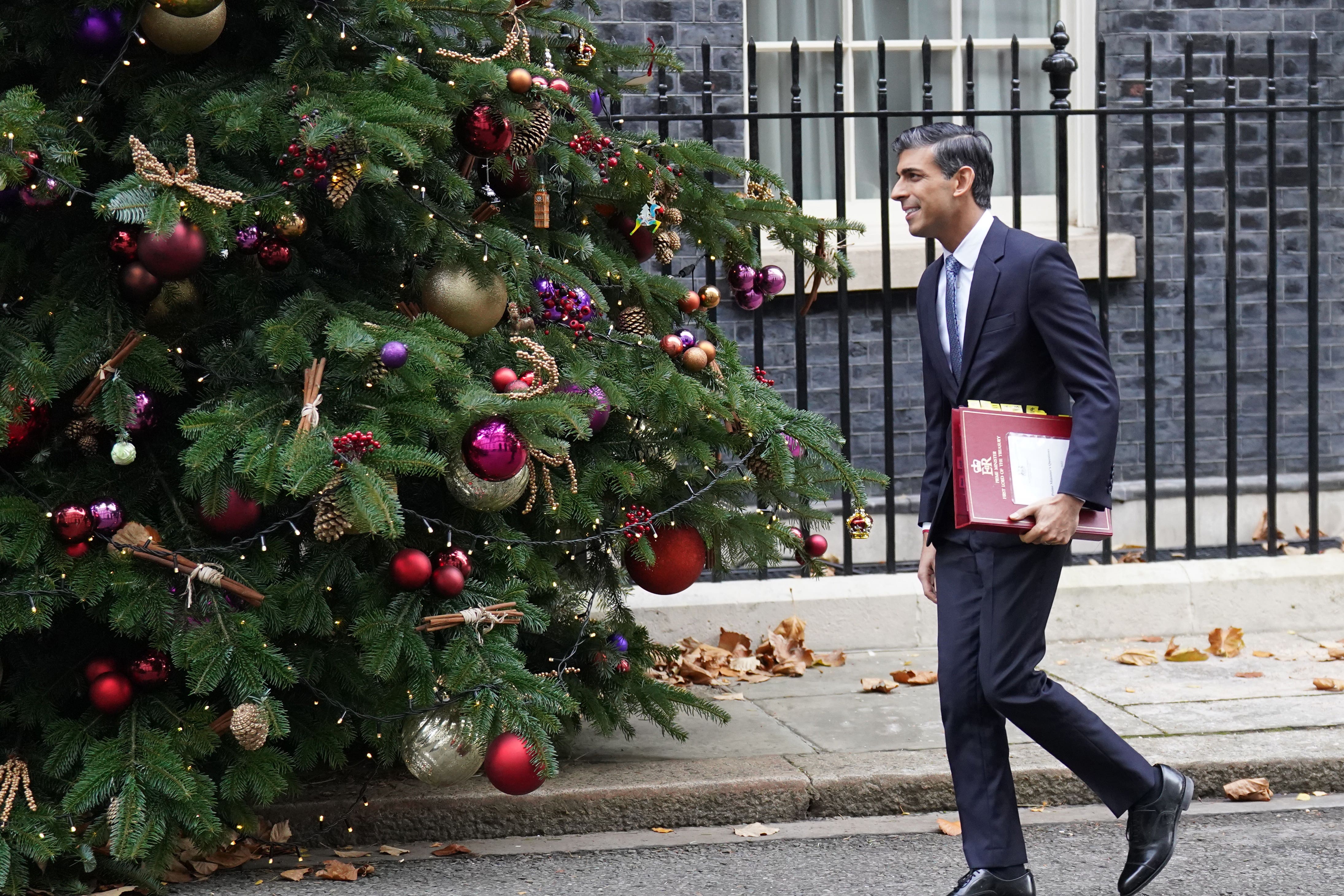A year the Tories will want to forget has done plenty of damage
Was Labour’s Keir Starmer the passive beneficiary of a Conservative Party crisis – or an astute tactician positioning himself to make the most of his opportunities? A bit of both, argues John Rentoul


The ruling assumption of politics changed this year. At the start of it, Boris Johnson was in trouble over lockdown-breaking parties in No 10, but the assumption was that if it got any worse, the Conservatives could fix the problem by changing leader.
By the end of the year, the party had changed leader twice and the Westminster consensus is that Keir Starmer is going to be prime minister soon. I am not sure that the consensus view is right, but it has changed the tenor of politics. “When the herd moves, it moves,” as Johnson commented bitterly, and once power starts to gravitate to a new star, it acquires a momentum of its own.
It has certainly had a dramatic effect on Starmer. Someone who knows him well, who was away for several months this year, returned to find him “transformed”. He was noticeably more confident and relaxed in the House of Commons towards the end of the year. He delivered some memorable lines. “The charge of the lightweight brigade” was a stylish barb at a time when Johnson was trying to fill cabinet posts as fast as people were resigning from them.
Was Starmer the passive beneficiary of a Tory crisis, though, or an astute tactician positioning himself to make the most of his opportunities? A bit of both, perhaps: the Conservative implosion was the main engine driving the change in politics, but Starmer was ruthless in putting himself just ahead of the government, so that he looked as if he could have done a better job.
In January, Starmer picked up the Liberal Democrat demand for a windfall tax on oil and gas producers, just before the Russian invasion of Ukraine increased the size of the windfall gain that was available to be taxed. In May, Rishi Sunak introduced the energy profits levy. As gas and electricity prices continued to climb, Starmer copied the next Lib Dem idea, that the government should borrow more to stop prices rising further. In September, Liz Truss introduced the energy price guarantee. Starmer was “Captain Foresight” at last.
The Conservatives had been so distracted by their leadership election that they were slow to realise the scale of the crisis – especially as the contest turned on Truss’s promise of tax cuts, a promise made as if the previous borrowing to pay for coronavirus support hadn’t happened. Thus the trap was set: not only did she run for the leadership promising to borrow to pay for tax cuts, but by the time she won it, she decided to borrow much more to pay for the energy price subsidy, and to cut taxes by much more than she said she would. All because she misread the instructions on the packet of Do-It-Yourself-Thatcherism: “It says something here about being bold, Kwasi, so let’s go for it.”
Starmer couldn’t have known that she would make such a big mistake, but by advocating a price freeze he tempted her to be more generous than her instinct at the start of the leadership campaign, which was to oppose “handouts” and to mock “Gordon Brownomics”, by which the government raises money and gives it back to people in a different form.

So, yes, Starmer’s success in 2022 was the product of his opponents’ errors more than of his own skill, but he continued to drive the Labour Party hard towards the centre, where the votes are, without ever pausing to explain what he was doing and why he was doing it. Perhaps the single most significant moment was when he addressed Just Stop Oil protesters in a TV interview: “Get up, go home.” (I liked the Melange mix version of the sound bite.)
It was Blairism, Jim, but not as we know it. Whereas Tony Blair engaged in a continual dialogue with his party, explaining that he was crushing some of its most fervently held beliefs for the greater good of winning elections and implementing other beliefs it also held, Starmer just got on with it, making Labour’s annual conference pay tribute to the late Queen and sing the national anthem.
It meant that when the Conservative Party finally came round from its fever dream, when Truss admitted “I cannot deliver the mandate on which I was elected” and made way for the candidate its MPs first suggested, Sunak faced a Labour opposition that had camped on the same centre ground that he was hoping to occupy.
For us actual Blairites, it was another disorienting moment in a roller coaster year. We had set off in January, sharing the Tory party’s optimism. Boris Johnson wasn’t much of a Blairite, but he had run on a “schools and hospitals first” manifesto and he had recruited Sir Michael Barber, head of Blair’s delivery unit, to help deliver it. By this year it was obvious that he lacked the commitment and attention to detail needed to drive the coronavirus-recovery wave of public service reform.
But there was an alternative prime minister to hand, who was good on detail and who had deployed the “overwhelming might of the British state” during the pandemic in a New Labour effort (or One Nation Tory, if you prefer) to save jobs and to protect the poor.
Unfortunately, Sunak was then brought low by a misjudged spring statement, which failed to protect the poor from rising inflation, and by The Independent’s revelations about his wife’s non-dom status – and news of his own US green card, which he had held until the previous year.

Sunak, who had been the most popular politician in Britain at the start of 2022, was suddenly less of a threat to a precarious prime minister. Yet Johnson was always in a weaker position than he seemed. Some of his more enthusiastic followers regarded his 80-seat majority as a miracle rather than the rather obvious outcome of an election fought against Jeremy Corbyn on a slogan that could unite Leavers and half of Remainers alike: “Get Brexit Done.”
Johnson was never very popular with his MPs, but there were limits to his support among party members too. One of the striking reminders in Professor Tim Bale’s brilliant book, The Conservative Party After Brexit, to be published in March, is of the circumstances of Johnson’s withdrawal from the leadership election in 2016 – now four leadership elections ago. I had forgotten that the first poll of Tory members, by YouGov, found Johnson trailing Theresa May by 55 per cent to 38 per cent in a theoretical run-off between the two. When Michael Gove sabotaged Johnson’s campaign, he did not bring down a candidate who would otherwise have been a certain winner.
Most Tory MPs remained sceptical of Johnson – even after he saved their seats or won new ones for them. But Tory members tend to become fiercely supportive of leaders and especially prime ministers once they are in place and have won an election. Hence the grassroots reaction when Sunak finally resigned as chancellor, bringing Johnson down.
By then, Sunak had recovered somewhat, but it quickly became obvious that he would struggle to win the vote of the membership – not least when he opened his campaign with a video warning against “fairytales”. When Truss made it through the MPs’ votes to secure a place in the final two, it was all over. Some may cavil at my description of Sunak as a Blairite – after all, he voted to leave the EU – but no one would describe Truss as a Blairite, despite her campaigning for Remain.
She fought a campaign not just on the issue of tax cuts, but of tax cuts for the rich. “People on higher incomes generally pay more tax,” she said. “So when you reduce taxes, there is often a disproportionate benefit because those people are paying more taxes in the first place.” And she would have fought it on public spending cuts too, except that one policy – to cut public sector pay outside London – blew up so badly that it was hurriedly dropped.
The period from August to October was one of deep gloom for Blairites. We put country before party, and it was obvious that a Truss premiership would do the country no good. We watched the live feed of the Queen lying in state, and the stream of people paying their idiosyncratic tributes, with the tap-tap-tap of the changing of the guard every 20 minutes. But spiritually, we were with Sunak in his Yorkshire fastness, contemplating the ruin of his ambition.
Then the roller coaster started to gain height again. Sir Graham Brady went into No 10. “It’ll be a preliminary meeting,” I told colleagues, “sounding each other out.” I went to lunch and ordered lamb kebab. “She’s out,” said a dining companion, as everyone in the restaurant listened to her words in Downing Street on their phones, each a second or so out of sync. I returned to the office in parliament, buying a sandwich on the way. I hope someone enjoyed my kebab.
Five days later, after Johnson flew back from his Caribbean holiday to declare for a second time in his career that he had “concluded that person cannot be me” (the words were slightly different on this occasion), Sunak was prime minister after all. Centrism had triumphed. The two main parties are now led by different stripes of Blairite, and the next election is likely to offer the British people a choice bounded by fiscal responsibility and basic compassion.
The Conservative Party ended up in the right place, but at the price of doing such damage to its reputation for competence that it may have tilted the playing field in favour of Starmerite Blairism rather than the Sunakite variety.






Join our commenting forum
Join thought-provoking conversations, follow other Independent readers and see their replies
Comments